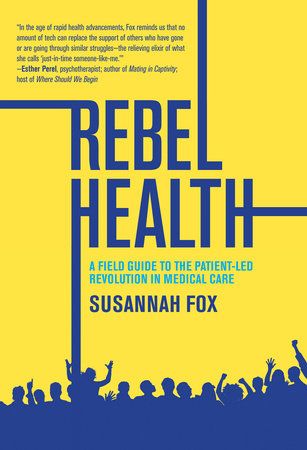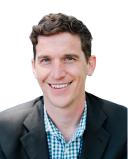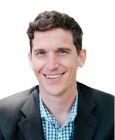Health
How You Can Hack Your Own Healthcare and Upgrade Your Life
A former top US health official's book is a manifesto for patient-led revolution.
Posted February 14, 2024 Reviewed by Monica Vilhauer
Key points
- Across two decades of research, Susannah Fox explored how Americans find health information online.
- During the Covid-19 pandemic, she was impressed with how quickly long Covid patients organized and advocated.
- Her new book, "Rebel Health," offers a playbook for patient-led innovation for all disease groups.
Researcher Susannah Fox believes that no one with a new diagnosis should ever have to feel alone.
When patients connect with peer support, they step into a community where they may ultimately find a starring role in pioneering solutions. Fox spent two decades learning from radical patient-led communities that leveraged the power of the internet to make strides against life-altering health issues, including cancer, diabetes, and most recently long Covid.
She took that idea to the Obama administration, where she served as chief technology officer at the Department of Health and Human Services.
In her new book Rebel Health: A Field Guide to the Patient-Led Revolution in Medical Care, she argues that every government agency and business that touches on health care should have an intake valve for insights generated by patients, survivors and caregivers.
Everyone can benefit from this underground revolution.
This interview has been edited for length and clarity.
Ryan Prior: If somebody wants to “hack” their own healthcare, how should they start?
Susannah Fox: A good place to start is what's called “personal science.” You can track what's important to you: a symptom, diet, sleep, or exercise routine. Start to make small changes and experiment with how to improve.
Another way to start is to be curious in community. Find others like you who share the same challenge. Learn from them about what they have tried.
RP: What are your four archetypes of patient-led innovation?
SF: The first group are “Seekers.” They sense they’re not getting the answers they need. They go out on the hunt for information. “Networkers” learn in community. They pool resources and make connections that other people can't see.
“Solvers” attack problems. They will take apart a device in order to put it back together better. Or they'll redesign a system, like the way a clinical trial is designed. “Champions” are those with access to mainstream resources that help patient-led teams scale, including funding, regulatory guidance, lab access, or media attention.
RP: How did working in government change your view about the vital work of patient communities?
SF: As a researcher, I have spent so much time doing fieldwork in small communities and spending one-on-one time with patients, survivors, and caregivers. Then, having the opportunity to serve in the government was like taking a helicopter ride where I all of a sudden could see the landscape of the American healthcare system in a way that I simply did not before. I could see both the challenge and the opportunity in a new way.
I wrote this book to introduce the patients, survivors and caregivers on the frontlines of health care to the executives and policymakers who have not had the privilege and the time to spend with these folks. These two groups have mission alignment. Serving in the government helped me see that a caregiver’s struggle often runs parallel to the concerns of a policymaker.
RP: When you ran your innovation lab at HHS, how did you bring groups together who might not have had the chance to talk to each other?
SF: One of the requirements of every one of our projects was to have multidisciplinary teams. That came from the principles of human-centered design and innovation scholarship. Multidisciplinary teams always come up with better questions and eventually come up with a better solution.
I started an initiative called "Invent Health" that focused on the innovations that I saw among people living with disability or relying on a medical device. I was really interested in the hardware of healthcare, and how the inventions we seek have multidisciplinary aspects to them.
So how might we bring together the biomedical engineers with the patients who will use that device? There’s a sense of possibility at the intersection of fields, where lived experience experts meet experts with degrees.
RP: Can those with lived experience outmaneuver people who are “stuck” in formal expertise?
SF: We need everybody to be part of this conversation and part of innovation teams, whether we're talking about medical devices, assistive devices, or even drug development. The closer we get to the person who's actually experiencing the challenge, the better that innovation or invention will be. One of the agencies that immediately understood what I was talking about was NASA, because they know that if something goes wrong on the International Space Station or on the mission to Mars, it's the astronauts themselves who are going to have to solve the problem. NASA understood exactly what I was talking about when I talked about how we need user-driven innovation in medical hardware.
RP: What was remarkable about how long Covid patients organized?
SF: I've been tracking this trend of peer-to-peer health care since the year 2000. What I often saw is that a patient group would identify a problem, either come up with a solution, or make a lot of noise and get the attention of a group of “Solvers.” It would take five to 10 years for an innovation to really start reaching the population that it needed to serve, including the identification of the problem, a proposed solution, the tracking of it, and worldwide attention to it. Long Covid broke every record.
The idea that patients themselves identified the condition, named the condition, came up with the way to start collecting evidence for it, and got the attention of the powers that be in most countries in under a year is extraordinary.
RP: How will technology change this revolution over the next decade?
SF: I’m excited about the revolution in sensors. You can collect medical grade data about yourself and your symptoms on your own at home. I'm really intrigued by that, along with telehealth at home. Clinicians monitor people and people can not only monitor themselves, but connect their data to other people's data. That's why I'm intrigued by the long Covid groups. They are pioneering these methods of tracking what's important to them. Clinicians are following their lead.
That is possibly a new way of pursuing science.





